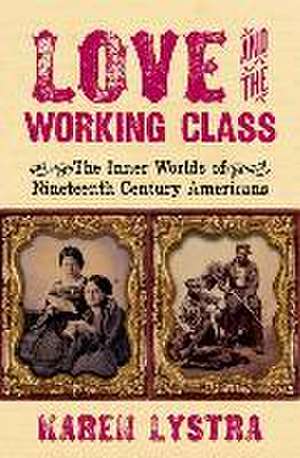Love and the Working Class: The Inner Worlds of Nineteenth Century Americans
Autor Karen Lystraen Limba Engleză Hardback – 19 iun 2024
Preț: 159.40 lei
Preț vechi: 180.21 lei
-12% Nou
Puncte Express: 239
Preț estimativ în valută:
30.50€ • 31.67$ • 25.44£
30.50€ • 31.67$ • 25.44£
Carte disponibilă
Livrare economică 18-24 februarie
Preluare comenzi: 021 569.72.76
Specificații
ISBN-13: 9780197514221
ISBN-10: 0197514227
Pagini: 360
Ilustrații: 42 b&w photos
Dimensiuni: 152 x 226 x 31 mm
Greutate: 0.66 kg
Editura: Oxford University Press
Colecția OUP USA
Locul publicării:New York, United States
ISBN-10: 0197514227
Pagini: 360
Ilustrații: 42 b&w photos
Dimensiuni: 152 x 226 x 31 mm
Greutate: 0.66 kg
Editura: Oxford University Press
Colecția OUP USA
Locul publicării:New York, United States
Recenzii
"This is a bold history, powered by phenomenal research and striking insights into the differences between working-class and middle-class understandings of love, family, and local ties in the 19th century."
"I have greatly looked forward to this book, and it does not disappoint -- it's a truly imaginative contribution to the history of emotion, the family and community, and the American working class. The range of letters on which the study is based is amazing, and the analysis of the distinctive emotional styles persuasive. There is rich material as well for students to explore in dealing with a more inclusive emotional history."
Love and the Working Class: The Inner Worlds of Nineteenth Century Americans makes a valuable contribution to the historiography and is a well-crafted piece of social history.
Lystra provides a window for readers to understand that the poor, like the rich, sought romantic relationships for reasons of love and emotional security. Her research reveals two interesting conclusions: the expression of sexual desire and the use of poetry to communicate both love and affection are two sentiments needed by all, regardless of income.
"I have greatly looked forward to this book, and it does not disappoint -- it's a truly imaginative contribution to the history of emotion, the family and community, and the American working class. The range of letters on which the study is based is amazing, and the analysis of the distinctive emotional styles persuasive. There is rich material as well for students to explore in dealing with a more inclusive emotional history."
Love and the Working Class: The Inner Worlds of Nineteenth Century Americans makes a valuable contribution to the historiography and is a well-crafted piece of social history.
Lystra provides a window for readers to understand that the poor, like the rich, sought romantic relationships for reasons of love and emotional security. Her research reveals two interesting conclusions: the expression of sexual desire and the use of poetry to communicate both love and affection are two sentiments needed by all, regardless of income.
Notă biografică
Karen Lystra is Professor of American Studies Emerita at California State University, Fullerton. She is the author of Dangerous Intimacy: The Untold Story of Mark Twain's Final Years and Searching the Heart: Women, Men, and Romantic Love in Nineteenth-Century America. She is a recipient of a National Endowment for the Humanities Fellowship, a Distinguished Faculty Award, and Outstanding Honors Professor of the Year. She is a former president of the Western Association of Women Historians.
